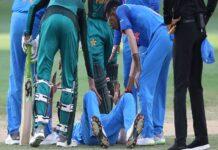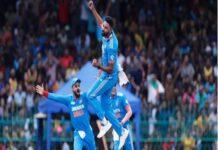There is a lot that is good about the IPL, but the dark bits are just too dark to be ignored.
YOU KNOW WHAT TIME OF THE YEAR IT IS? IT’S THAT TIME OF THE YEAR WHEN CONVERSATIONS ON CRICKET ARE CONDUCTED IN ALL CAPS, AND ALL REGULAR PUNCTUATION IS REPLACED BY EXCLAMATION MARKS! IDEALLY, MULTIPLE EXCLAMATION MARKS!!!
If you’re not living under a rock, you might have noticed that it is, in fact, Indian Premier League (IPL) season—two months of the year when everything is dialled up to eleven.
As with most things today, the IPL too has polarized opinion through the decade of its existence.
Camp 1, consisting of the purists, sees this tournament as a bastardization of the game. A format where a 12-ball 25 can be termed a great innings—as often happens in the many moments of hyperbole that make up a T20 game—is not a format to be taken seriously. Besides, this is all just time-pass, not cricket.
They are not completely wrong. The one IPL match I watched from the (packed) stands—as opposed to the press box—was a surreal experience. The excitement levels of the crowd had almost zero connection with the action on the field, and the loudest cheers were eerily Pavlovian responses to a particular riff the DJ belted out every few minutes.
Camp 2 consists of the people who are actually tuning in every day, and there are millions of them, which suggests the product, while it may be flawed, is also extremely attractive. It’s cricket every night, so it’s easy to form habits, and, unlike most other cricket, there’s a context and consequence to every game.
Mumbai, Kolkata and Chennai are three franchises that have also managed to acquire large, devoted fan bases, putting to rest the theory that city would never trump country in a cricket culture that is steeped in nationalism.
As with all debates, the two camps have taken extreme and inflexible positions.
The fans see only the skills on show; breathtaking stroke-play, brilliant catches (of which there are many), young cricketers making the most of a massive platform, unbelievable chases under pressure…
The purists see exactly the opposite: cross-batted heaves, dollies dropped (many!), young cricketers ruined by a meaningless format, chases so unbelievable that they can only be described as dodgy…
The truth, as always, lies somewhere in the middle.
As daily entertainment goes, the unscripted (the purists are allowed to snigger here) drama provided by sport is a refreshing change from reruns of Friends or Sooryavansham.
The IPL has also provided more for young cricketers than domestic cricket could ever dream of doing—at least the ones who have their heads screwed on right. Not only are more players making more money than they would have thought possible, they’re also getting a platform where a few good performances can fast-track their careers.
There is a lot that is good about the IPL, but the dark bits are just too dark to be ignored. To believe that the league is untainted by corruption is naive, given the number of players, teams and officials that have faced sanctions. For every success story, there’s one of despair; for every Yuzvendra Chahal, there’s an Ajit Chandila.
The IPL, given its immense popularity and the money and muscle behind it, is not going to crash and burn like the Australian cricket team did after the ball-tampering mess.
But it’s easy to imagine a future in which the IPL is reduced to semi-WWE (World Wrestling Entertainment) status. You sense at the back of your mind that crucial bits are being scripted, you part-jokingly yell “FIXED!” at the television set two-three times a match. But you watch anyway because, well, it’s such good time pass. #KhabarLive







